All I wanna do is have some fun
Lance Armstrong is back in cycling and the Texan is having a ball. In his largest press conference...
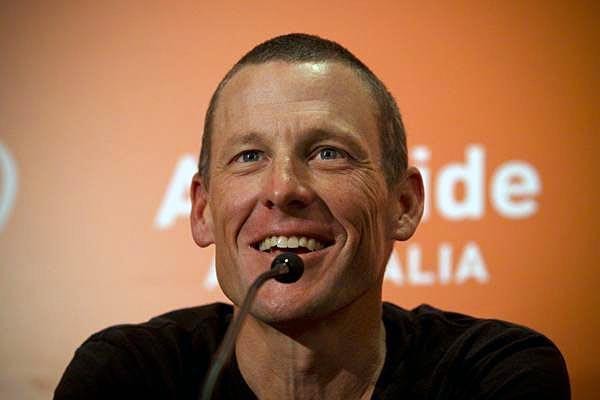
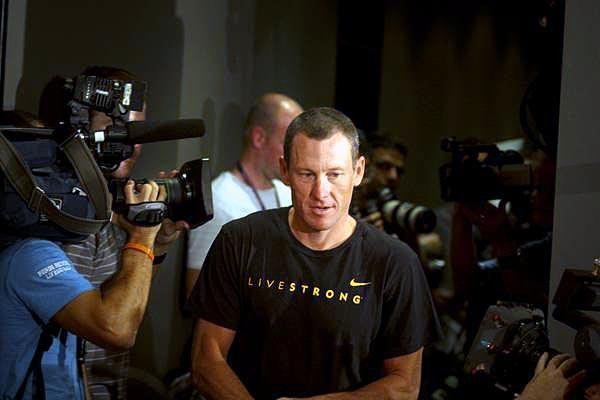
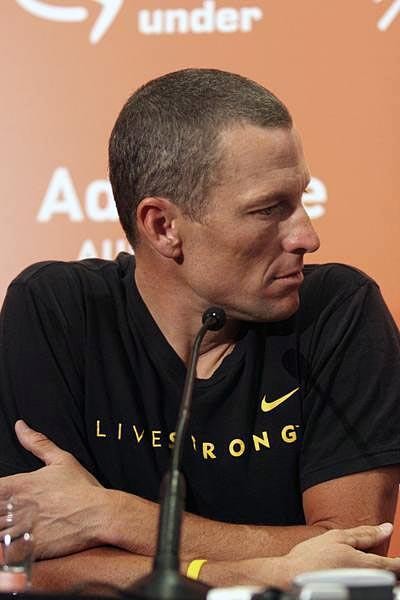
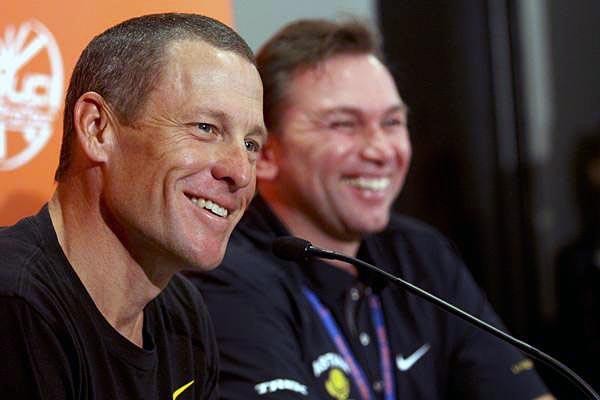
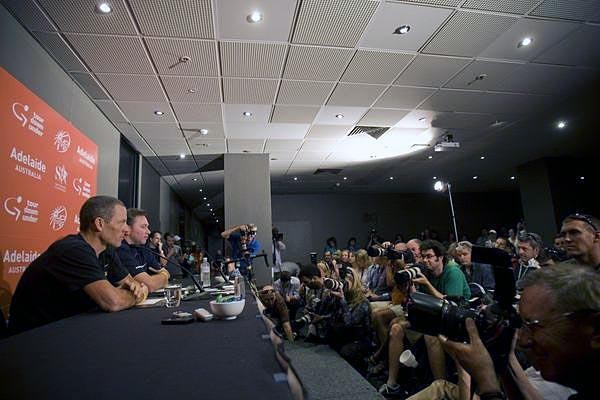
News feature, January 17, 2009
Lance Armstrong is back in cycling and the Texan is having a ball. In his largest press conference since arriving in Australia, Armstrong declared he's fallen in love with cycling again while fielding questions that ranged from irrelevant to simply bizarre.
"I'm relaxed because I'm having fun," said Armstrong. "I'm having a hell of a lot of fun. I will be totally honest with you, I wake up every day and I am doing this for free. I asked him [Johan Brunyeel] can I come and race and I'm racing for free. I suppose I could have called other teams and I suppose the number could have gotten up there, but there's no money here. I'm doing it because I love to do it. I put my clothes on every day and get on that bike because I want to do it.
"I can't say 2004, 2005 was like that," he added. "I think it became a job then and I've recaptured that passion. I can't say it any simpler than I'm just having a hell of a good time."
The Astana rider was both entertaining, passionate and evasive throughout the conference. He quipped with those assembled whenever fronted with a question relating to his age, but masterfully crafted indirect responses to sensitive questions.
"Lance, have you had to make any concessions to the way you train because of your age?" asked one journalist.
"That's not a nice question. Kick her out," he responded.
The latest race content, interviews, features, reviews and expert buying guides, direct to your inbox!
The banter continued later in the 64-minute gathering when asked, "In old age, what do you think your ultimate legacy will be?"
"Did you say in old age? Kick him out. You're no spring chicken! So you're asking me what I want on my tomb stone? No, I'm just giving you grief," he joked.
The light hearted approach continued when asked if he could win his comeback race, having been rated a chance by some. "I have been drinking beer and sitting on my arse for three and a half years," he said. "How can they think that? Tell them next time they say that 'no, no, no, no, he told me he's been drinking beer for three and a half years'.
"Let me tell you if the opportunity is there I will definitely take it," he added. "I guarantee I will take every opportunity to be at the front of the race, animate the race and be active. No bluffing, no hiding. If the race dictates that and I feel good, I promise you I will attack. I just don't know that I will be in the position to do that."
The seven time Tour de France winner admitted a criterium, to be held on Sunday evening, isn't his preferred way to return to the sport. Armstrong hopes changes made to this year's course will benefit him, and minimise the risks involved.
"It wouldn't be my first choice, but it might not be a bad thing," he said. "I've looked at the map of the course and it looks pretty straight forward. I believe it's changed a bit since last year when there were a lot of different turns. So it looks on paper to be something you can roll around a little easier on.
"It sort of goes full circle, I mean I started back in the late '80s doing criteriums in the United States," he added. "So we're back into it. The main thing is to try and stay out of trouble, stay out the front and avoid the drama."
One spot Armstrong is hoping to be amongst the drama is the Willunga stage. Riders will have to do two laps of the stage's key climb this year, known traditionally for making or breaking a rider's Tour Down Under campaign.
While the rider isn't backing himself for success down under, he also won't be putting money on anyone else. Armstrong believes the first race of the year is always a lottery and that Tour Down Under in particular has a tradition of being won by wildcards.
"No clue. I've no clue," he said. "I've been following professional cycling close enough, the first race of the season nobody ever knows for sure. Guys have amazing off seasons, train their arse off and show up super fit, super fast. Who would have picked last year André Greipel winning four stages, nobody can pick that. So it's very difficult to say and I'll be the last one you want to ask."
While Armstrong is unsure of his ability to perform over the next week, he has admitted to feeling the competitive juices flowing once more. That is a feeling, he says, he felt even when contesting local events back in Texas.
"I had a nice block of training before I came here, so I got a pretty good idea of where I was," said Armstrong of his own form. "The only question mark then becomes the trip here and how much that takes out of you, but that went pretty smoothly as well. There's not much of a time change from Hawaii where I came from.
"I still go in with modest expectations," he said. "Not to sound like a slacker but there's certainly no major goals other than to make it through and get back into the rhythm of racing."
Armstrong also dismissed reports that the appearance fee he has been paid to contest Tour Down Under will go to the charity. Earlier in the week South Australian Premier Mike Rann's media department told Cyclingnews that any monies which may have been paid to Armstrong will go to the Livestrong charity.
"That's not true," he said. "In the past few years I've spent most of my time speaking all over the world just like President Clinton, or Al Gore. I'm not getting paid to race, is there a fee for other things? Yes. But that's not any different to what I've done in the last three or four years."
The comeback
Armstrong answered a variety of questions throughout the long press conference – ranging from music taste, his thoughts on screw top wine bottles, through to his political persuasions and ambitions – but one area of actual interest covered was the difference between his two comebacks. The rider returned to the sport in 1998 after overcoming his battle be cancer.
"It's similar. It's similar in the sense that I'm extremely motivated and extremely uncertain as to how it will go," he said. "I remember my first race back in 1998 at Ruta del Sol I did a press conference too, although not so many people there, that's one thing different. But going into that event I didn't know how I would ride but at the same time I was hungry, I was motivated, I was inspired to come back. So those are the similarities, the difference is obviously the age which I think is everybody's big question mark."
With many high-profiled comebacks in sporting history, many of which were dismal failures, Armstrong was asked if he's concerned over the impact his return could have on his legacy. While admitting it was a risk, Armstrong believes any risk is outweighed by the potential benefits to the fight against cancer.
"I think this is different in the sense I'm coming back for a different reason," he said. "I've been very open, honest and clear about it, if I come back and get fifth in the Tour but we've created a movement around the world that's seen countries and continents commit literally billions of dollars to this disease, I think you start to talk about a different kind of legacy then that's the legacy that starts to grow. I'm willing to take that risk.
"From a sporting perspective, yes, there's a great risk and it might happen, but from a human perspective and from a cause perspective I think it is well, well worth the sporting risk," he said.
Despite earlier joking about his age, Armstrong said its impact on the return to cycling professionally has made little difference. Even during his three and a half years away from the sport Armstrong has maintained a healthy and competitive lifestyle, including competing in the New York Marathon.
"With the preparation we've put in to get to this point the only thing I can point to is a little bit more stiffness and soreness which I suppose is normal for somebody in their upper 30s," he said. "But the recovery is good, the power is good. I don't want to say I feel the same as I did in my early 30's but I'm not far off, I feel pretty strong."
Armstrong believes his return has already been a success, just by making the start line in Adelaide, South Australia. But the American is cautious of the risks involved with the sport.
"Failure would be a broken collarbone or obviously if I was the first guy dropped on Tuesday that would be a failure, that would not be good," he said. "I don't have any clear ambitions or any standards in my mind as to what's a success. To me it's partly successful just being here and being able to race earlier than I would have. It was a big objective of mine to get back on the bike and start racing as early as possible."
The one question Armstrong failed to end speculation on, however, was relating to the length of his return. All Armstrong would say, when asked how long his return would last, was: "It's at least one year."
See also:
Tour Down Under: When the Stars align
Lance Armstrong: Contador is the best
News feature: Armstrong looking for balance
Armstrong responds to testing times
Armstrong return puts science in the crosshairs Armstrong watching the Tour from afar